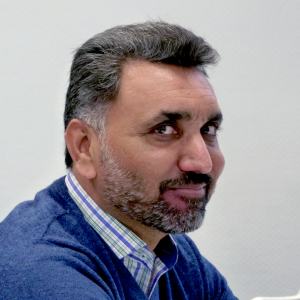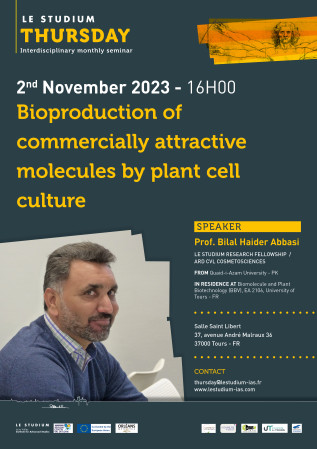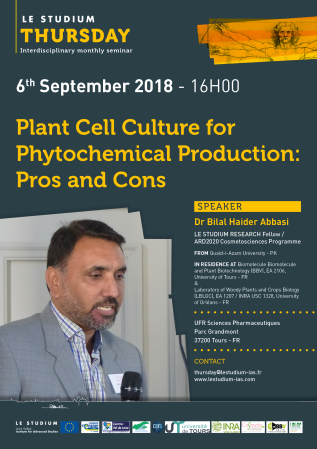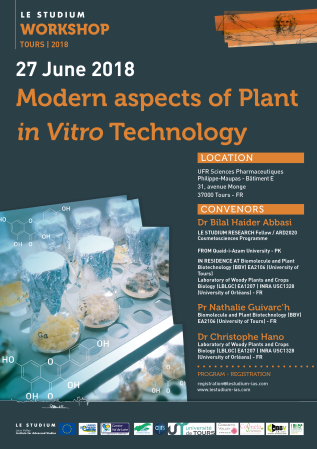Prof. Bilal Haider Abbasi

From
In residence at
Biomolecule and Plant Biotechnology (BBV), EA 2106, University of Tours - FR
Host scientist
Prof. Nathalie Guivarc’h
BIOGRAPHY
Bilal Haider Abbasi received his Ph.D. from the Institute of Process Engineering, Graduate University of Chinese Academy of Sciences, China in 2008. Currently, he is Tenured Professor of Biotechnology at Quaid-i-Azam University, Islamabad, Pakistan, where he heads the Plant Cell Culture laboratory. His research focuses mainly on biotechnological implications of medicinal plants for biosynthesis of phytochemical and cosmeceuticals. His work and expertise are internationally recognized and evidenced by his publications in the most prestigious journals like The Lancet and Nature Medicine. In recognition of his achievements, he has been awarded with Pakistan Academy of Sciences Gold medal (2016) and best young researcher award by Quaid-i-Azam University (2014). He is also PI of many national and international research projects. He is member Pakistan Academy of Sciences since 2014.
PROJECT 2023
Exploration of the potential of plant cell cultures of different species as a source of cosmetic ingredients
Plant cell cultures offer an exciting avenue for the exploration and development of cosmetic ingredients. This technique involves growing plant cells in a controlled environment outside of their natural habitat. It allows the production of valuable compounds found in plants without the need to grow the whole plant.
Some of the key points regarding the potential of plant cell cultures as a source of cosmetic ingredients are: sustainable sourcing, active compounds, controlled production, conservation of rare and endangered species, enhanced bioactivity, customization and innovation, scalability and cost, regulatory considerations, etc. Overall, plant cell cultures hold significant potential as a sustainable and innovative source of comsetic ingredients. The main objective of this project is to develop and discover cometic compounds and their production and biosynthesis in well known plant species. However, the problem, usually encountered by plant cell culture is the low production rate and yield of phytochemicals than wild grown plants. Therefore, several techniques have been adopted to enhance biosynthesis of these compounds in cell cultures of plant species. Elicitation is considered as most attractive technique. Elicitation not only enhances biosynthesis of phytochemicals but also influencing their production by influencing biomass accumulation and other parameters as well.
PROJECT 2018-2019
Strategies to enhance cosmeceuticals in in vitro cultures of herbal plants
Cosmeceuticals are plant derived products intended to improve the health and beauty of the skin by providing a specific result. Most of cosmeceuticals are defined by their biologically active ingredients (BAIs). Phenolic compounds are well established BAIs of these cosmeceuticals. Caffeic acid, quercetin, flavonoids, gallic acid, etc. are common phenolic compounds used in cosmeceuticals. These compounds are extracted from different plant species like Echinacea, Silybum, Linum, Citrus, etc. However, plant derived phenolic compounds are privileged in cosmetic industry due to benefits they offer. Therefore, whole cosmetic industry is looking for efficient and feasible production platforms for cost efficient production of these cosmeceuticals by herbal plants.
Use of plant cell culture technology offers an attractive alternative for the production of plant-based cosmeceuticals. Compared to field grown plants, cell cultures can be cultivated in a controlled and contained environment. Production in cell culture also offers possibilities for process optimization, independent of environmental effects, etc. Although plant cell culture technology is very widespread in phytopharmaceutical industry, but it is not yet very common in the cosmetic industry.
The problem, usually encountered by plant cell culture is the low production rate and yield of BAIs. Therefore, several strategies have been devised to enhance concentration of these compounds in cell cultures of herbal plants. Elicitation of BAIs is considered as most reliable and feasible strategy. Elicitation not only enhances biosynthesis of BAIs but also influencing their production by stimulating biomass accumulation. Elicitors are the chemical compounds from abiotic and biotic sources that can stimulate stress reponses in plants, leading to enhanced biosynthesis of BAIs. The number of parameters, such as elicitor type, dose, treatment schedule, duration of exposure are major factors influencing biosynthesis of BAIs in plant cell.
Publications
The purpose of the current study was green synthesis of ZnO-nanoparticles (NPs) from different tissues of Silybum marianum (L.) Gaernt. (i.e., seeds, wild plant, in vitro derived plantlets and callus cultures) followed by extensive characterization and evaluation of their biological potency. ZnO-NPs thus synthesized were subjected to characterization using standard techniques such as XRD, FTIR and SEM. Thermal stability of synthesized NPs was also evaluated using thermo-gravimetric analysis. Highly stable crystalline NPs with size ranging between 30.8 and 46.0 nm were obtained from different tissues of S. marianum. These NPs have revealed a wide range of biological applications showing antioxidant, moderate α-amylase inhibitor, antibacterial and cytotoxicpotencies. The highest antibacterial activity (20 0.98 mm) was shown by seed extract-mediated ZnO NPs against Staphylococcus aureus (ATCC-6538). Seed extract-mediated ZnO NPs also showed the most potent antioxidant activity (27.7 .9 gAAE/mg, 23.8 0.7 gAAE/mg and 12.7 1.9% total antioxidant capacity (TAC), total reducing power (TRP) and DPPH-free radical scavenging assay (FRSA), respectively). All of the synthesized ZnO NPs also showed cytotoxic activity against the hepato-cellular carcinoma (HepG2) human cells. Interestingly, these ZnO NPs were also highly biocompatible, as evidenced by the brine shrimp lethality and human red blood cells hemolytic assays. Among all of the NPs synthesized and used, the effect of seed extract-mediated NPs was found to be most promising for future applications.
Breast cancer is one of the most commonly diagnosed cancers around the globe and accounts for a large proportion of fatalities in women. Despite the advancement in therapeutic and diagnostic procedures, breast cancer still represents a major challenge. Current anti-breast cancer approaches include surgical removal, radiotherapy, hormonal therapy and the use of various chemotherapeutic drugs. However, drug resistance, associated serious adverse effects, metastasis and recurrence complications still need to be resolved which demand safe and alternative strategies. In this scenario, phytochemicals have recently gained huge attention due to their safety profile and cost-effectiveness. These phytochemicals modulate various genes, gene products and signalling pathways, thereby inhibiting breast cancer cell proliferation, invasion, angiogenesis and metastasis and inducing apoptosis. Moreover, they also target breast cancer stem cells and overcome drug resistance problems in breast carcinomas. Phytochemicals as adjuvants with chemotherapeutic drugs have greatly enhanced their therapeutic efficacy. This review focuses on the recently recognized molecular mechanisms underlying breast cancer chemoprevention with the use of phytochemicals such as curcumin, resveratrol, silibinin, genistein, epigallocatechin gallate, secoisolariciresinol, thymoquinone, kaempferol, quercetin, parthenolide, sulforaphane, ginsenosides, naringenin, isoliquiritigenin, luteolin, benzyl isothiocyanate, α-mangostin, 3,3′-diindolylmethane, pterostilbene, vinca alkaloids and apigenin.
Lignans and neolignans are important biologically active ingredients (BAIs) biosynthesized by Linum usitatissimum. These BAIs have multi-dimensional effects against cancer, diabetes and cardio vascular diseases. In this study, yeast extract (YE) was employed as an elicitor to evaluate its effects on dynamics of biomass, BAIs and antioxidant activities in L. usitatissimum cell cultures. During preliminary experiments, flax cultures were grown on different concentrations of YE (0–1000 mg/L), and 200 mg/L YE was found to be optimum to enhance several biochemical parameters in these cell cultures. A two-fold increase in fresh (FW) and dry weight (DW) over the control was observed in cultures grown on MS medium supplemented with 200 mg/L YE. Similarly, total phenolic (TPC; 16 mg/g DW) and flavonoids content (TFC; 5.1 mg/g DW) were also positively affected by YE (200 mg/L). Stimulatory effects of YE on biosynthesis of lignans and neolignans was also noted. Thus, 200 mg/L of YE enhanced biosynthesis of secoisolariciresinol diglucoside (SDG; 3.36-fold or 10.1 mg/g DW), lariciresinol diglucoside (LDG; 1.3-fold or 11.0 mg/g DW) and dehydrodiconiferyl alcohol glucoside (DCG; 4.26-fold or 21.3 mg/g DW) in L. usitatissimum cell cultures with respect to controls. This elicitation strategy could be scaled up for production of commercially feasible levels of these precious metabolites by cell cultures of Linum.
Linum usitatissimum is a source of pharmacologically active lignans and neolignans. An effective protocol has been established for the enhanced biosynthesis of lignans and neolignans in cell cultures of Linum usitatissimum by using chitosan addition. Gene expression analysis of monolignols (PAL, CCR and CAD), lignans (DIR, PLR and UGT) and neolignans (PCBER) biosynthetic genes by RT-qPCR as well as monolignol biosynthetic PAL, CCR and CAD enzyme activities evidenced a stimulation following chitosan treatment. Validated reverse phase high-performance liquid chromatography coupled to diode array detection was used to quantify secoisolariciresinol diglucoside (SDG) and lariciresinol diglucoside (LDG), dehydrodiconiferyl alcohol glucoside (DCG) and guaiacylglycerol-β-coniferyl alcohol ether glucoside (GGCG) showed that chitosan treated cell cultures had better accumulation of these metabolites. Maximum enhancements of 7.3-fold (28 mg/g DW) occurred for LDG, 3.5-fold (58.85 mg/g DW) in DCG and while the least enhancement of 2-fold (18.42 mg/g DW) for SDG was observed in 10 mg/l chitosan treated cell cultures than to controls. Furthermore, same concentration of chitosan also resulted in 1.3-fold increase in antioxidant activity. Compared to the lignans and neolignans accumulations observed in wild type and RNAi-PLR transgenic flaxseeds, chitosan-treated cell cultures appeared to be a very effective production system for these compounds.
Melatonin as plant growth regulator induces differential effects on metabolites that are responsible for reduction, capping and stabilization of zinc oxide nanoparticles. Phytochemical analysis of callus cultures was performed and results were compared with callus cultures supplemented with other plant growth regulators (α-napthalene acetic acid, 2,4-dichlorophenoxy acetic acid and thidiazuron). Highest total phenolic and flavonoid content [42.23 mg of gallic acid equivalent (GAE) g−1 DW and 36.4 mg of (quercetin equivalent) g−1 DW, respectively] were recorded at melatonin (1.0 µM) + NAA (13.5 µM). ZnONPs were synthesized from NAA (13.5 µM) and melatonin (1.0 µM) + NAA (13.5 µM)-induced calli extracts separately and characterized via X-ray diffraction, Fourier transform infrared spectroscopy (FTIR) and scanning electron microscopy (SEM). FTIR analysis confirmed the presence of phenolics and flavonoids that were mainly found responsible for reduction and capping of ZnONPs. SEM analysis showed triangular shaped ZnONPs synthesized from melatonin + NAA callus extract and these NPs were more dispersed as compared to the spherical-agglomerates of ZnONPs synthesized from NAA-mediated callus extract. Melatonin + NAA callus extract-mediated ZnONPs (having smaller size) were more potent against multiple drug resistant bacterial strains, e.g. Bacillus subtilis, Escherichia coli and Pseudomonas aeruginosa by producing zone of inhibitions 17 ± 0.76 mm,10 ± 0.57 mm and 13 ± 0.54 mm, respectively.
Fruits of Silybum marianum (L.) Gaernt are the main source of taxifolin derived flavonolignans. Together, these molecules constitute a mixture called silymarin with many useful applications for cosmetic and pharmaceutic industries. Here, a validated method for the separation of the silymarin constituents has been developed to ensure precision and accuracy in their quantification. Each compound was separated with a high reproducibility. Precision and repeatability of the quantification method were validated according to the AOAC recommendations. The method was then applied to study the natural variability of wild accessions of S. marianum. Analysis of the variation in the fruits composition of these 12 accessions from Pakistan evidenced a huge natural diversity. Correlation analysis suggested a synergistic action of the different flavonolignans to reach the maximal antioxidant activity, as determined by cupric ion reducing antioxidant capacity (CUPRAC) and ferric reducing antioxidant power (FRAP) assays. Principal component analysis (PCA) separated the 12 accessions into three distinct groups that were differing from their silymarin contents, whereas hierarchical clustering analysis (HCA) evidenced strong variations in their silymarin composition, leading to the identification of new silybin-rich chemotypes. These results proved that the present method allows for an efficient separation and quantification of the main flavonolignans with potent antioxidant activities.
Zinc oxide nanoparticles (NPs) have emerged as a novel elicitor for enhanced biosynthesis of secondary metabolites in in vitro plant cell cultures. The current study was aimed to explore elicitation abilities of ZnO-NPs for enhanced accumulation of lignans and neolignans in cell cultures of Linum usitatissimum. We optimized concentration of zinc oxide NPs before carrying out a full-fledged experiment. Subsequently, an optimum dose of 100 mg/l was introduced into the culture medium on day 0, days 0 and 15, and finally days 0 and 25. We observed that repeated elicitation stimulated various parameters and physiological responses in Linum usitatissimum cell cultures than one-time elicitation. Repeated elicitation of cell cultures on day 0 and 15 resulted in highest fresh weight (412.16 g/l) and lignans production (secoisolariciresinol diglucoside 284.12 mg/l: lariciresinol diglucoside 86.97 mg/l). Contrarily, repeated elicitation on day 0 and 25 resulted in highest DW (13.53 g/l), total phenolic production (537.44 mg/l), total flavonoid production (123.83 mg/l) and neolignans production (dehydrodiconiferyl alcohol glucoside 493.28 mg/l: guaiacylglycerol-β-coniferyl alcohol ether glucoside 307.69 mg/l). Enhancement in plant growth and secondary metabolites accumulation was several fold higher than controls. Furthermore, a linear relationship existed between total phenolic and flavonoid contents which in turn was correlated with higher antioxidant activities.
Linum flavum hairy root lines were established from hypocotyl pieces using Agrobacterium rhizogenes strains LBA 9402 and ATCC 15834. Both strains were effective for transformation but induction of hairy root phenotype was more stable with strain ATCC 15834. Whereas similar accumulation patterns were observed in podophyllotoxin-related compounds (6-methoxy-podophyllotoxin, podophyllotoxin and deoxypodophyllotoxin), significant quantitative variations were noted between root lines. The influence of culture medium and various treatments (hormone, elicitation and precursor feeding) were evaluated. The highest accumulation was obtained in Gamborg B5 medium. Treatment with methyl jasmonate, and feeding using ferulic acid increased the accumulation of aryltetralin lignans. These results point to the use of hairy root culture lines of Linum flavum as potential sources for these valuable metabolites as an alternative, or as a complement to Podophyllum collected from wild stands.
The purpose of current study was green synthesis of silver nanoparticles (AgNPs) from seeds and wild Silybum plants in comparison with their respective extracts followed by characterization and biological potency. The biologically synthesized AgNPs were subjected to characterization using techniques like XRD, FTIR, TEM, HPLC and SPE. Highly crystalline and stable NPs were obtained using Silybum wild plant (NP1) and seeds (NP3) with size range between 18.12 and 13.20 nm respectively. The synthesized NPs and their respective extracts revealed a vast range of biological applications showing antibacterial, antioxidant, anti-inflammatory, cytotoxic and antiaging potencies. The highest antioxidant activity (478.23 ± 1.9 μM, 176.91 ± 1.3 μM, 83.5 ± 1.6% μgAAE/ mg, 156.32 ± 0.6 μgAAE/mg) for ABTS, FRAP, FRSA, TRP respectively was shown by seed extract (NP4) followed by highest value of (117.35 ± 0.9 μgAAE/mg) for TAC by wild extract (NP2). The highest antifungal activity (3 mm ± 0.76) against Candida albicans was shown by NP3 while antibacterial activity of (6 mm against Klebsiella pneumonia) was shown by NP3 and NP4. The highest anti-inflammatory activity (38.56 ± 1.29 against COX1) was shown by NP2. Similarly, the high value of (48.89 ± 1.34 against Pentosidine-Like AGEs) was shown by NP4. Also, the high anti-diabetic activity (38.74 ± 1.09 against α-amylase) was shown by NP4. The extracts and the synthesized NPs have shown activity against hepato-cellular carcinoma (HepG2) human cells. The HPLC analysis revealed that the highest value of silymarin component (silybin B 2289 mg/g DW) was found for NP4. Silydianin is responsible for capping. Among the green synthesized AgNPs and the extracts used, the effect of NP4 was most promising for further use.
Final reports
Herbal plants accumulate large amounts of phenolics and pentacyclic triterpenes. The present research project deals with the in vitro culture induction from stem and leaf explants of several medicinal plant species of Centre-Val de Loire under various plant growth regulators (PGRs) for the production of antioxidant and anti-ageing compounds. Among all the tested PGRs, auxins and cytokinins used alone or in combination induced callogenesis in stem/leaf-derived explants. Callus culture displayed feasible total phenolic content and antioxidant activity under optimum hormonal combination. HPLC analysis revealed the presence of plectranthoic acid, oleanolic acid, betulinic acid, caffeic acid and rosmarinic acid. Complete antioxidant and anti-aging potential of extracts with very contrasting phytochemical profiles were investigated. Correlation analyses revealed rosmarinic acid as the main contributor for antioxidant activity and anti-aging hyaluronidase, advance glycation end-products inhibition and SIRT1 activation, whereas, pentacyclic triterpenoids were correlated with elastase, collagenase and tyrosinase inhibition. Altogether, these results clearly evidenced the great valorization potential of herbal plants from CVL for the production of antioxidant and anti-aging bioactive extracts for cosmetic applications.
One of the Asteraceae family's most significant therapeutic herbs is Echinacea purpurea (L.) Moench. The plant is extremely rich in anti inflammatory and antioxidant chemicals, that can be produced effectively and sustainably by in vitro cultures, which are often enhanced by the inclusion of an elicitor in the culture media. In the present investigation, TDZ was effectively utilized to induce E. purpurea callus cultures. Additionally, different melatonin dosages were evaluated for their impact on biomass accumulation, antioxidant capability, and secondary metabolite synthesis. In callus treated with 25μM melatonin, the highest biomass accumulation, total phenolic output, and total flavonoid production were noted. At the same moderate concentration, the best DPPH radical scavenging activity and overall antioxidant capacity were also observed. A positive association was reflected between biomass and these factors. Notable inhibitory effects were seen against pancreatic lipase, alpha-glucosidase, and alpha-amylase after administration with exogenous melatonin, respectively, during the investigation of the potential of callus cultures. These results emphasized the need to look into the existing strategy in more detail in order to identify novel approaches to treating diabetes and obesity. In HPLC analysis, maximum amounts of metabolites resulted at concentrations of 25–50 μM, except amino acids that were associated with the lowest melatonin concentration. Our research showed that TDZ can be used for efficient callus induction of E. purpurea, and elicitation with melatonin may be a useful tactic for boosting biomass, phenolic compounds, flavonoids, and antioxidant capacity as well as numerous enzyme inhibitory effects.



